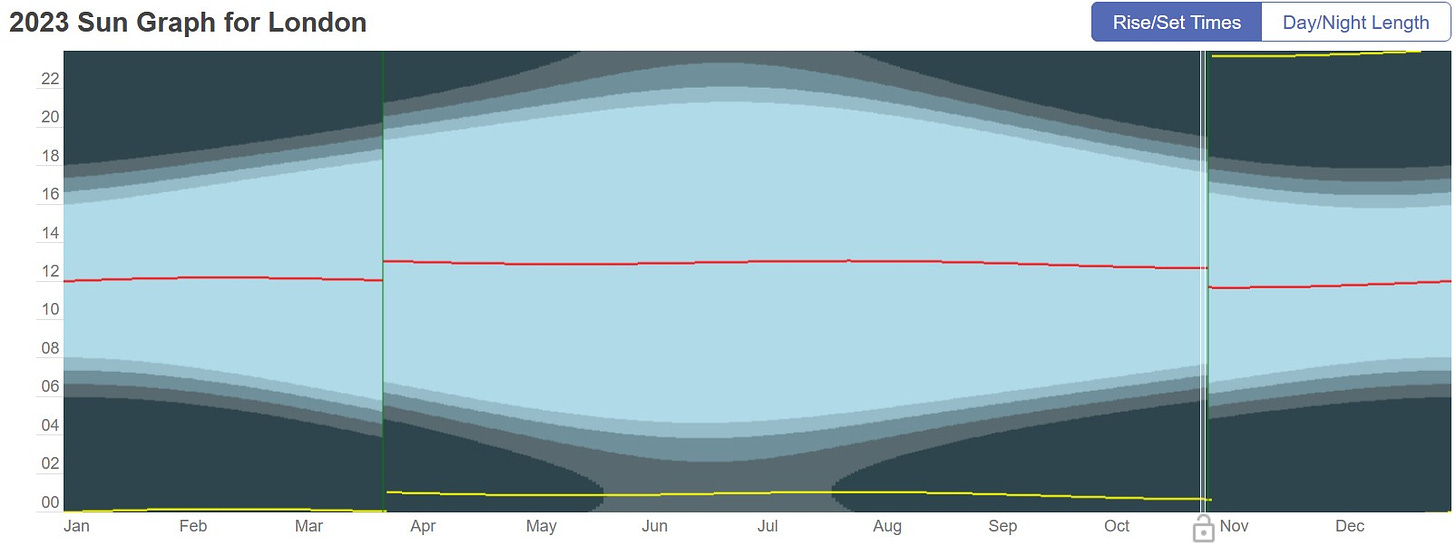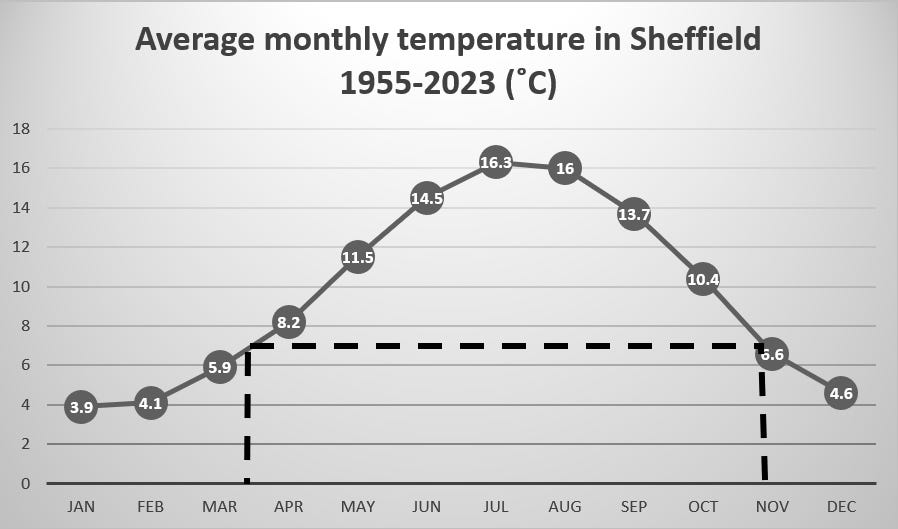The times they are a changin’
The clocks go back tonight, but why do we have to wait so long for them to go forward again?
The clocks go back this weekend. Don’t forget you get an extra hour in bed on Saturday night when the clocks tick back from 01:59 to 01:00 early on Sunday morning.

I wrote for the Guardian this week about the arguments for and against doing away with Daylight Saving Time, the biannual clock changing routine we undergo in the autumn and the spring.
The argument for our autumnal reversion to Greenwich Mean Time (GMT) seems to be largely for the sake of the mornings. It ensures that most people who work a 9-to-5 in the UK will always arrive at work in the daylight. For example, even up in Edinburgh (whose latitude below which over 93% of the UK population live) official daylight never arrives later than quarter to nine, even in the depths of winter.
There are campaigns to abolish the changing of the clocks in favour of the year-round lighter mornings of GMT and rival campaigns to replace the daylight saving routine with continual British Summer Time (BST). The GMT camp point to the benefits of lighter mornings and darker evenings to our sleep and wake cycles and our overall health. Year-round BST fans point to the increased leisure time afforded by lighter evenings (along with the commensurate health benefits), decreases in energy use and reductions in crime.
Irrespective of the strength of the arguments on either side, for now we seem to be stuck with our current system in which we lose an hour of evening light each autumn to afford us brighter mornings through the winter. If pushed, I’d probably sit in the year-round BST camp in favour of darker mornings but lighter evenings. I’m not a big fan of darkness encroaching before 5pm, but what probably bothers me the most about the current system of switching back and forth between GMT and BST is the asymmetry of its timing.
Asymmetry
The clocks go back around 7-8 weeks before the winter solstice – the shortest day. Why then don’t they go forward again 7-8 weeks after the winter solstice in mid-February, when we would have the same amount of overall daylight. We are forced to suffer through the ignominy of another four weeks until mid-March before we get our hour of evening daylight back.
It’s perhaps a little known fact that the earliest sunset doesn’t fall on the same day as the solstice. In fact the sunset starts to get later a few days before the shortest day, but because the sunrise is getting later more quickly than the sunset our daylight hours continue to shorten for a few more days until the solstice. When, like me, you’re desperate to look on the bright side in the depth of winter the lighter evenings seem to mark a turning of the tide sooner than waiting for the solstice. Even after the solstice the sunrise continues to get later and later, while the daylight extends more quickly in the evening lengthening the day overall.
Could this be the reason why the clocks go forward so late in the spring? It seems not. That small asymmetry might account for a delay of a few days while we wait for the mornings to catch up with where they were when the clocks went back in late October, but not a whole month. This year when the clocks go back (on the 29th of October) the onset of daylight in London will switch from 07:46 to 06:48. For the next few weeks daylight will arrive later and later until we turn the tide after the solstice and sunrise starts to creep earlier and earlier. The next time we’ll get daylight at 06:48 is 28th Feb – still a whole month before the clocks actually go forward on the 31st of March. Why do we have to wait so long?
Figure 1: A sun graph for London depicting the times of daylight (light blue) and night (dark blue) separated by shades representing twilight. Discontinuities depict the vernal and autumnal clock changes. The wider light blue region clearly indicates we have more daylight overall at the spring clock change than we do at the autumn one. From https://www.timeanddate.com/sun/uk/london
Unless of course the timing of daylight saving isn’t about daylight at all. Perhaps it’s about the seasons instead. You will have noticed that the seasons seem to lag behind the daylight hours. The solstice is only three weeks into meteorological winter (December, January and February), but the clock change comes on the last weekend in October, about a month before the onset of ‘winter’. Symmetrically, the reverse clock change, occurring at the end of March, takes place about a month after the end of meteorological winter.
If you look at average monthly temperature charts for places in the UK, like the one for Sheffield given below, you’ll notice that the temperature at the end of October is similar to the temperature at the end of March. Perhaps daylight saving then is less about daylight and more about sparing us having to go out in the absolute coldest temperatures early in the morning in the depth of winter?
Average monthly temperatures in Sheffield over the period 1955-2023. The temperature at the end of March matches roughly with the temperature in early November (black dashed line).
No, that would make too much sense. The real reason is much more stupid than that. As far as I can tell, the timing of the clock going forward and back is based on the idea that there is an ideal post-change dawn time. For example, in Manchester we might decide that that time is 7 O’clock, so we wait until late October when dawn occurs at around 8 O’clock and then we put the clocks back an hour so that the post-change dawn occurs at 7. In the spring if we’re looking for a post-change dawn of 7 O’clock then we need to wait until the sun is rising at 6 O’clock before we put the clock’s forwards an hour. This means waiting until there are more hours of daylight in the day overall.
Many would argue that the bureaucratic origins of the asymmetry in time changes make what (in daylight savings time) is already a poorly conceived and outdated idea, even more idiotic. But I’m afraid we’re going to be forced to suffer the darker evenings until late March every year, at least until someone starts a campaign to symmetrise our clock changing habits. Now that gives me an idea…





Thanks for sharing your thoughts. In Germany school starts around 8 o‘clock. Switching back to normal time is just at the right time to avoid darkness on the way to school in the morning.
I personally have some problems from the switching itself, mainly waking early after switching to normal time for a long time, so would prefer not switching at all (and choosing normal time..)
Here in China there's both no daylight saving nor any different time zones. I've never heard of anyone complaining!